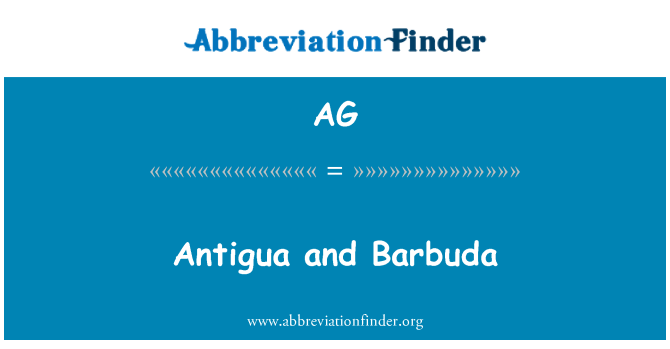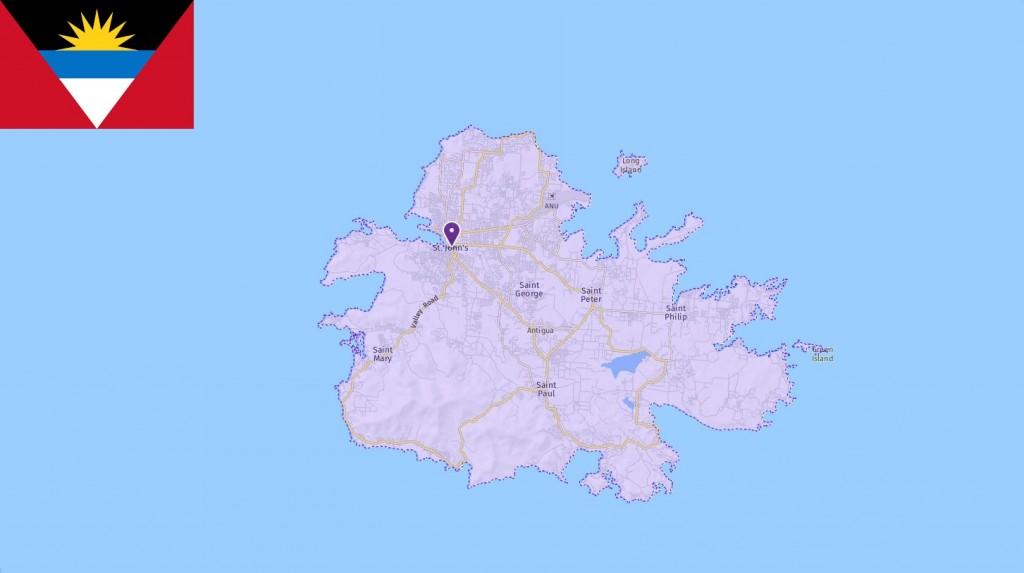AG is the abbreviation for Antigua and Barbuda, the 182nd largest country in the world. Antigua and Barbuda is a country located in Central America. St. John’s is the capital city of Antigua and Barbuda. Major cities include St John’s (population: 24,226), All Saints (population: 2,526), Piggotts (population: 1,878), Liberta (population: 1,668), Bolands (population: 1,657), Potters Village (population: 1,433), Codrington (population: 1,325), Parham (population: 969), Carlisle (population: 831), and Cedar Grove (population: 789).
Country Profile
- Capital: St. John’s
- Language: English
- Area: 440 km2
- Population: 100,963
- Currency: East Caribbean dollar (XCD)
- Time zone: UTC-4
- Calling code: 1-268
- ISO 2-Letter Abbreviation: AG
- UN 3-Letter Abbreviation: ATG
- Internet TLD: .ag
- State Government Website: http://ab.gov.ag
List of Antigua and Barbuda Acronyms
The most commonly used abbreviations about Antigua and Barbuda are AG which stands for Antigua and Barbuda and XCD which means East Caribbean dollar (Antigua and Barbuda currency). In the following table, you can see all acronyms related to Antigua and Barbuda, including abbreviations for airport, city, school, port, government, and etc.

Geography
Antigua and Barbuda is an island state consisting of three low-lying islands in the eastern Caribbean. The third island in addition to Antigua and Barbuda is Redonda, a small uninhabited island shaped like a steep cliff. Antigua is a limestone lake surrounded by grounds and coral reefs as well as several small islands. Barbuda is a flat and wooded coral island, 40 kilometers north of Antigua.
The climate in Antigua and Barbuda is tropical. The islands are exposed to tropical hurricanes and have an average rainfall of 990 millimeters per year. In 2017, Barbuda was hit hard by Hurricane Irma. About half of the population became homeless, and the construction cost more than 100 million US dollars.
The biggest environmental problems are the lack of fresh water and the destruction of coral reefs, caused by hurricanes and tourism.
History
Kristoffer Columbus joined the archipelago in 1493. The islands had already been inhabited for 4000 years. In 1667 the islands became a British colony. The sugar plantations were then the most important source of income, and society was kept up with slave labor. Exploitation of workers in slave-like conditions lasted until World War II, although slavery was abolished over 100 years earlier. In 1939, the country’s first trade union was founded, which improved workers’ living conditions. Antigua and Barbuda became independent in 1981, but are still part of the British Commonwealth. After independence, tourism became the country’s most important source of income.
The Labor Party in the country (ALP) won the election in 1951 and has, with the exception of the years 1971-1976, retained the majority in parliament from 1951 to 2004. Prime Minister Vere Bird and his family were accused of corruption and arms smuggling to Colombia. The scandals caused major demonstrations, leading to a historic defeat for the party in 2004. After eight years as an opposition party, the ALP came back hard in 2014, with promises to improve the country’s economy and new party leader. They are still in power today.
Society and politics
Antigua and Barbuda is an independent parliamentary state within the Commonwealth of Nations, consisting of the United Kingdom and former British colonies. The country is a monarchy with the British Queen as the formal head of state, represented by a Governor General of the country. Executive power lies with the government, and legislative power with the two chambers of parliament. In practice, Antigua and Barbuda have a two-party system.
The island kingdom is considered one of the more well-functioning small island states in the Caribbean. Almost the entire population lives on Antigua. The standard of living is higher than in many neighboring countries. Nevertheless, there is a fairly large proportion of the poor. Among the most disadvantaged are families without access to sanitation and clean water.
The working population has several welfare benefits such as pension schemes and sick pay. Those who are out of work have little or no support. Drug abuse is not uncommon. The country lies along the smuggling route from South and Central America to Europe and the United States. The government has tried to fight drug trafficking and other crime with stricter legislation and higher penalties.
Economics and Commerce
The main trade route in Antigua and Barbuda is tourism. It has been the country’s main industry since the 1960s, accounting for over half of the country’s gross domestic product (GDP). Two US military bases in Antigua also generate significant revenue. The sugar industry, which used to be the country’s most important industry, has lost its importance due to a decline in sugar prices on the world market.
Antigua and Barbuda have long been known as a place for questionable financial services. Antigua also received a stamp of approval in the region when it came to money laundering. Following targeted countermeasures, the International Regulatory Body in 2001 declared that the country cooperates fully in this fight. The country’s financial reputation gained a bang in 2009, when the country’s largest investor, a millionaire from Texas, was indicted for fraud.
View this article in other languages:
Deutsch – Français – 繁體中文


